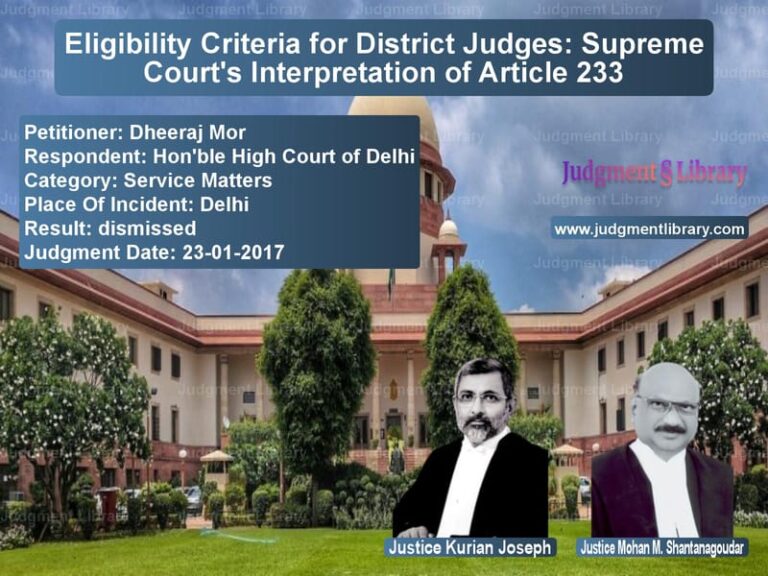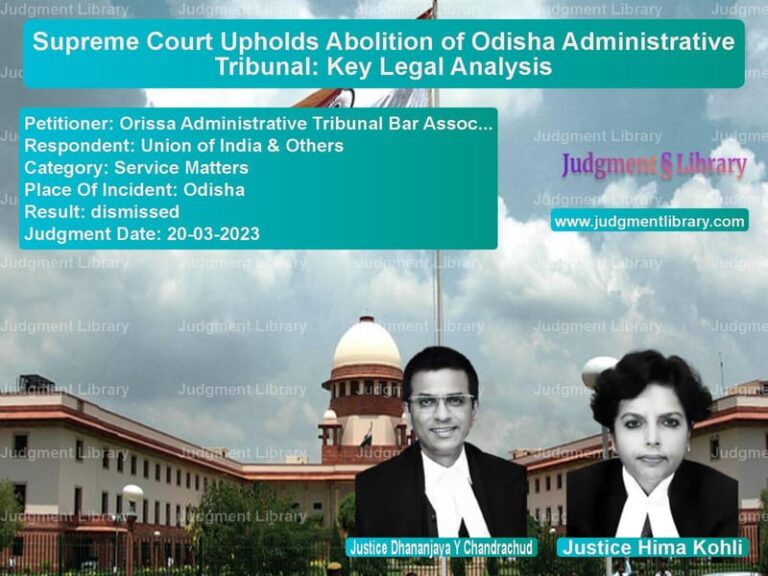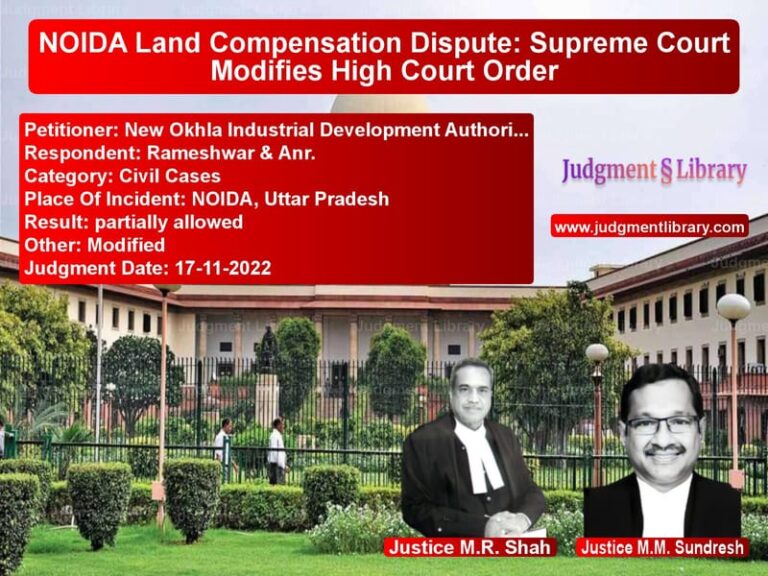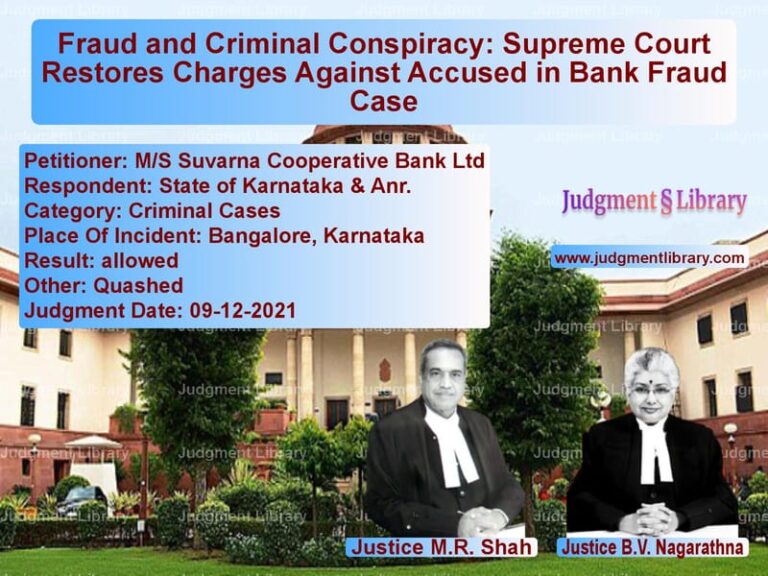Supreme Court Upholds Conviction in Political Murder Case: Key Legal Analysis
The Supreme Court of India recently delivered a significant judgment in R. Baiju vs. The State of Kerala, upholding the conviction of a political leader in a murder case that stemmed from a dispute over coercive sales of coir mats. The case provides important insights into how courts evaluate evidence in politically sensitive criminal cases and the legal principles governing conspiracy charges.
The case involved a violent altercation that escalated into a fatal attack, resulting in one death and injuries to three others. The appellant, R. Baiju, a municipal councillor and influential political leader, was convicted under Sections 304 Part II (culpable homicide not amounting to murder), 323, 324, 427, 450 read with Section 120B (criminal conspiracy) of the Indian Penal Code. The Supreme Court’s judgment meticulously examines the evidence and legal principles involved in establishing criminal conspiracy and culpable homicide.
Arguments of the Appellant:
The appellant’s counsel argued that: “A6 was roped in as the main conspirator who had not joined the frontal attack alleged by the prosecution on the deceased and his family members.” They contended that key witnesses did not name the appellant in their initial statements and that the testimony of PW7, a member of a rival political party, was unreliable due to pending cases between them.
Arguments of the State:
The prosecution maintained that the appellant was the mastermind behind the attack, arguing that: “The motive and presence of A6 at the scene of crime is thus established.” They presented evidence showing the appellant’s involvement in two altercations earlier that day – first with the deceased over refusal to buy coir mats, and later with the deceased’s son during a municipal council meeting.
Supreme Court’s Analysis:
The Court carefully examined the sequence of events and evidence:
1. Establishing Motive: The Court noted “the incident that happened in the afternoon is spoken of by PW2 and 3, the family of the deceased & PW4, a neighbour” and found the motive was established through two altercations earlier that day.
2. Conspiracy Evidence: Regarding the conspiracy charge, the Court observed: “The evidence of PW7 who saw A1 to A6 standing in front of the house of A5 just before the incident happened, is the physical manifestation of the conspiracy.”
3. Political Influence on Investigation: The judgment noted attempts to shield the appellant: “A6 was an influential political leader of the ruling party and his name was purposefully not included in the array of accused.” However, the Court relied on State of Karnataka v. K. Yarappa Reddy to hold that questionable investigation doesn’t necessarily vitiate the case if other evidence is credible.
4. Knowledge Requirement for Section 304 Part II: The Court concluded: “A6 definitely had the knowledge that the attack perpetrated on the accused could lead to death and the attack was carried out under his watchful eyes.”
Key Legal Principles Established:
The judgment reinforced several important legal principles:
– Conspiracy Evidence: Citing State of Tamil Nadu v. Nalini, the Court noted conspiracy is often proved by inferences from acts and words since such plans are typically hatched in secrecy.
– Hostile Witnesses: The Court gave limited credence to PW4 who turned hostile, but still accepted parts of her testimony that corroborated other evidence.
– Political Cases: The judgment demonstrates how courts navigate politically sensitive cases where influential accused may attempt to manipulate investigations.
Conclusion:
The Supreme Court dismissed the appeal, upholding the appellant’s conviction and sentence. This judgment serves as an important precedent on establishing criminal conspiracy and culpable homicide, particularly in cases involving influential political figures and questionable investigations. The Court’s meticulous analysis of evidence and application of legal principles ensures that justice is not compromised by external pressures.
Petitioner Name: R. Baiju.Respondent Name: The State of Kerala.Judgment By: Justice Sudhanshu Dhulia, Justice K. Vinod Chandran.Place Of Incident: Kerala.Judgment Date: 15-04-2025.Result: dismissed.
Don’t miss out on the full details! Download the complete judgment in PDF format below and gain valuable insights instantly!
Download Judgment: r.-baiju-vs-the-state-of-kerala-supreme-court-of-india-judgment-dated-15-04-2025.pdf
Directly Download Judgment: Directly download this Judgment
See all petitions in Murder Cases
See all petitions in Attempt to Murder Cases
See all petitions in Custodial Deaths and Police Misconduct
See all petitions in Terrorist Activities
See all petitions in Extortion and Blackmail
See all petitions in Judgment by Sudhanshu Dhulia
See all petitions in Judgment by K. Vinod Chandran
See all petitions in dismissed
See all petitions in supreme court of India judgments April 2025
See all petitions in 2025 judgments
See all posts in Criminal Cases Category
See all allowed petitions in Criminal Cases Category
See all Dismissed petitions in Criminal Cases Category
See all partially allowed petitions in Criminal Cases Category







